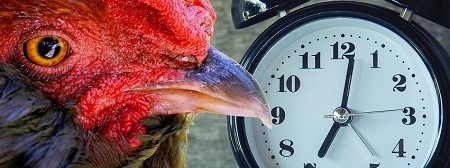Are you the type of person who likes to get up early?
Or would you never get up early by choice?
You may be relieved to know that Ben Franklin was not speaking for everyone when he said:
Early to bed and early to rise, makes a man healthy, wealthy and wise.
I have observed that patients have different body clock rhythms. However, I was surprised to find out that our genes – specifically the PER 3 gene – code for whether we will be an early riser or not. This gene codes for how much sleep we need, the depth of our sleep, and when we sleep best. That’s also why we tend to take after one or the other of our parents in how early we get up.
Why are we different?
Michael Breus, PhD theorizes why we have different body clock rhythms. He explains it is for survival of the group. By people having a range of body clock rhythms, someone is awake on watch covering the group though a 24 hour day, including the nighttime.
Dr. Breus has written about his research in the book “The Power of When.” In it, he talks about the best time to do many things, depending on your body clock type, which he calls ” chronotype.”
Four types of sleep/arise time are described in his research:
Dolphins: one half of the brain is alert and swimming while the other half is sleeping, which fits light sleepers or insomniacs
Lions: morning hunters, which describes those who get up early after sleeping deeply, refreshed after 7 hours
Bears: ramble and hunt throughout the day, describing those that need more hours of sleep and sleep deeply, awaking a little less than refreshed usually follow the sun’s rhythm
Wolves: nocturnal hunters, which describes those who prefer to be awake at night, then sleep somewhat deeply and are refreshed after 7 hours
The majority of us are Bears. However, a lot of wolves, lions and dolphins are forced to act like Bears because of their work schedule. If you are not sure which fits you, take Dr. Breus’s quiz here.
The grass is always greener
When you have determined your chronotype, you might not like the results. Nevertheless, Dr. Breus says that you cannot change your chronotype.
Some people aspire to be early risers, yet it is just not in their genes. On the other hand, if you were born a Lion, you will never do well staying up late.
We all do best in health and engaging life when we follow our chronotype determined at birth. At least during our peak years of 21 to 65.
Dr. Breus does say that chronotypes do change related to our stage of life. When very young, a toddler, we tend to be Lions, getting up early and going to be early.
Teens are notorious for needing a lot of sleep but going to bed later, and they have difficulty getting up in time for school. This makes them wolves.
Seniors, no matter which type they were for the majority of their lives, tend to become Lions or Dolphins in their later years.
Timing is Everything
Dr. Breus details the best time to do a myriad of things in his book, based on your chronotype rhythm. He includes when it is best to
- have sex
- plan something important
- fitness
- fight illness
- weigh yourself
- sleep
- eat and drink
- learn something new
- make a decision
- brainstorm
- make a deal
- travel
Body Cycle Alertness
Perhaps the most far-reaching aspect of your body clock to understand is when you are most alert, sharp, strong, and clear. You may have observed this for yourself. However, are you following it? Peak alertness hours tend to be:
- Dolphins: mid-afternoon
- Lions: Early morning
- Bear: Mid-morning
- Wolf: Early evening
In addition, if we use our body clock to time decisions, we can benefit. It is important to understand that we make decisions based on emotion and reason. By recognizing emotional times and using appropriate reason, we can make wise decisions.
No matter what time of day it is, when we are presented with a potential gain by making the choice, we are more likely to be cautious. However, when we are presented with a choice that is a potential loss, we tend to become afraid, insecure, and reckless. Therefore, we need to be completely aware of how a decision is framed. Is it presented as a potential loss? Beware.
In addition, by honing in our decision time, we can moderate emotional reactions in a decision. The following table details the on and off times for each chronotype:
| DOLPHIN | LION | BEAR | WOLF | |
| ON times to decide | 10 AM – 2 PM 4 PM – 10 PM |
6 AM – 11 AM 2 PM – 9 PM |
8 AM – 1 PM 3 PM – 11 PM |
12 PM – 2 PM 5 PM – 1 AM |
| OFF times to decide | 9 PM – 6 AM 2 PM – 4 PM |
10 PM – 6 AM 11 AM – 2 PM |
1 PM – 3 PM 12 AM – 8 AM |
1 AM – 12 PM 2 PM – 5 PM |
For myself as a Lion, I now know not to decide midday, between 11 in the morning and 2 in the afternoon, as well as after 9 PM. I already know nighttime internet shopping can be dangerous.
Beyond Circadian (daily) Rhythms
Women are well aware we have monthly rhythms. Even after menopause, we tend to tune into the moon’s cycle. Men are also ruled by the moon and monthly cycles whether they acknowledge it or not.
We see the effect of the moon on the Earth’s waters in tides. Humans are affected monthly by the moon most in their hormonal rhythms. In a study, not surprisingly, people had lowest sleep hours, depth, quality, and ability to fall asleep at the full moon. I know it is true for me and I hear people report that all the time.
On the other hand, two weeks later at the dark moon, the study showed that people slept more deeply, longer, and fell asleep more easily.
In winter when days are shorter, our body rhythms reset. Our hormones shift as well as our metabolism. Millions of people suffer the effects of seasonal affective disorder, also known as the winter blues. This is characterized by a general discontent, sadness, excess sleepiness or insomnia, depression, appetite changes, fatigue, social isolation, and lack of concentration.
Wolves and Dolphins are most affected. Even though the impulse is to hibernate, hibernating will not help. Getting direct sunlight, exercising outdoors, and eating lightly will help moderate this seasonal swing.
Next steps
To read more about how to use your body clock to your advantage, read Michael Breus’s The Power of When. Besides sleep patterns, he goes into when to exercise and eat as well as times that have to do with alertness and decisions.
If you have sleep issues, you might want to check out his book Good Night: The Sleep Doctor’s 4-Week Program to Better Sleep and Better Health.
Dr. Breus also gives and overview of chronobiology in a TED talk.
When are you most alert and productive? Please comment below how these descriptions of animal chronotypes fit you.





